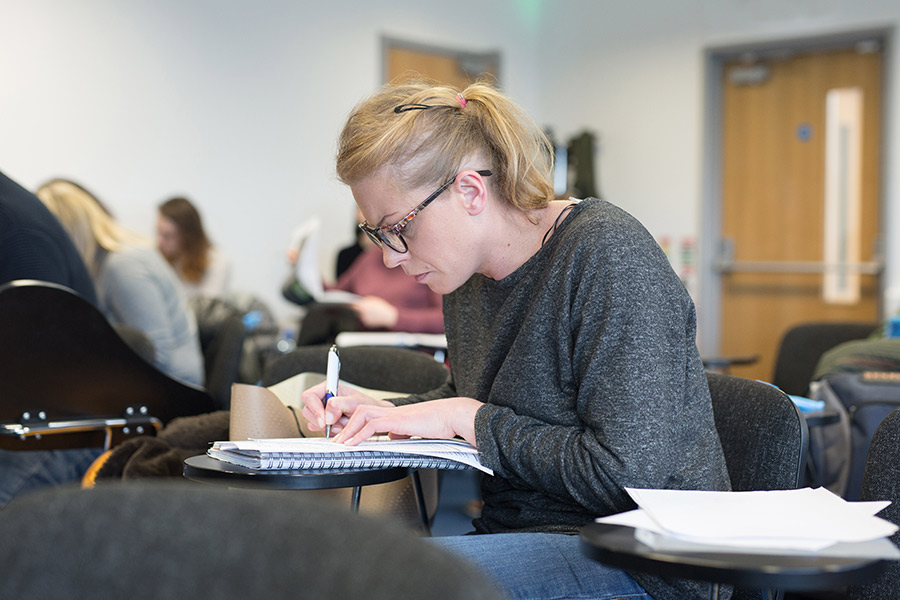The Ultimate Guide on How to Find a Master’s Degree

Getting a master’s degree is an investment. Between the financial planning you need to do for it and the time spent on it, there’s a lot to think about.
And if you’re investing time, money, and effort into a program, you want to make sure it’s the right one for you.
We’ve created the ultimate guide on
- why you should study a master’s degree,
- how to find one that’s the right fit for you,
- and how to apply for a master’s degree in Ireland.

What are the Differences Between Common Postgraduate Qualifications?
There are more opportunities for postgraduate qualifications than just a master’s degree.
In fact, there are three common postgraduate qualifications available. In ranking order from least time invested to most time invested, those are:
- Postgraduate certificate or diploma
- Master’s degree
- Doctoral degree
What is a Postgraduate Certificate or Diploma?
A postgraduate certificate or diploma is given after a shorter course of study. Once you’ve received your bachelor’s degree, you can apply for a postgraduate certificate or diploma program.
These postgraduate certificate or diploma programmes can help you further advance your knowledge and expertise in a subject area, whether it’s research-based or vocational.
It can help you change your career, update skills for particular industries, or get licensed in certain fields. And once you finish your programme, you’ll receive either a “certificate in” your chosen field of study or a “diploma in” your chosen field of study.
What is a Master’s Degree?
A master’s degree is based on academic study. Depending on what master’s degree you are pursuing, you may spend more time researching, or you may spend more time in a lecture hall. Certain master’s degrees can be a hybrid of the two.
Certain master’s degrees are an essential stepping stone toward a career in a specific field such as becoming a doctor or a lawyer.
What is a Doctoral Degree?
A doctoral degree is heavily focused on research. You’ll mainly apply your time towards an original piece of study and research. After finishing a doctoral programme, you’ll receive a Doctor of Philosophy degree, or a Ph.D.
How is a Master’s Degree Different from an Undergraduate Degree?
A master’s degree comes after you finish your undergraduate degree or bachelor’s degree.
As you continue with your studies, you narrow down your focus to one particular area. Your master’s degree lets you continue to do that!
Because a bachelor’s degree is broader in terms of what you study, you’ll spend more time earning it. And you won’t focus solely on your specialty. Instead, you’ll work on a well-rounded education by completing broad course prerequisites.
After you earn your bachelor’s degree, you’ll be able to complete your master’s. And, as we mentioned, you’ll hone in on a more focused area of study. Usually, that means earning a master’s in one of the following:
- Master of Science (MSc)
- Master of Science in Nursing (MSN)
- Master of Arts (MA)
- Master of Fine Arts (MFA)
- Master of Business Administration (MBA)
Within those master’s degrees, you can choose a more specific course plan. For example, at Innopharma, we offer Master of Science programmes. More specifically, within the Master of Science programmes, you can choose from:
- Master of Science in Food Business Management & Technology
- Master of Science in Pharmaceutical Business & Technology

Why Study a Master’s Degree?
As you continue your search on how to find a master’s degree, you need to think about why you should study for one.
There are many reasons why pursuing a master’s degree is worth it.
From letting it help you advance your career, to benefiting from an increase in pay, to working on personal development, choosing a master’s degree can be a great decision for many people.
How Does Further Study Compare with Undergraduate Experiences
In general, bachelor’s degrees, or undergraduate experiences, are broader in terms of study. While they’re much more detailed than a secondary school diploma, they’re still broad when compared to a master’s degree.
If you’re studying for an industry that requires in-depth knowledge, skills, and experience, like the MedTech industry or pharmaceutical industry, pursuing a master’s degree is an excellent option.
What Does a Master’s Degree Do for Employability and Career Prospects
One major question we hear from those pursuing a master’s degree is “how will a master’s degree help my career?”
There are a number of different ways a master’s degree benefits your employability and career prospects.
For one, you have a more nuanced knowledge of the industry you chose, versus those who are only bachelor’s degree holders. This gives a competitive advantage over those who don’t have the same set of skills you do. Major pharmaceutical companies in Ireland are looking towards those who do have a master’s degree to come on board.
Secondly, a master’s degree is an investment that you’ll receive a payoff for. With more experience and knowledge comes better salary negotiations as you search for career prospects.

How to Find a Master’s Degree That’s Right for You
So, if a programme is in the cards, how do you find a master’s degree that’s right for you?
After all, there are several broad master’s degree areas of study, with even more focused programmes within them.
Here’s a look at how to find a master’s degree that will fit you:
Take a Look at Your Current Degree
First, take a look at your current degree. That will help you gauge what you should study in a master’s programme.
If your undergraduate degree is in fine arts, but you decide you want to study a master’s in psychology, you may face a challenge. That’s because your undergraduate degree prepares you for the next level of study within the same field. It’s still possible to move from one field to another in your master’s degree, but you may have to take prerequisites first.
Now, if your undergraduate degree is in biology, and you decide you want to pursue a master’s in food business and technology, that’s an easier transition!
Your current degree will help you narrow down what you might want to study.
Consider What You’re Passionate About
Your current undergraduate degree isn’t the only deciding factor. Maybe you have your bachelor’s degree, but you found you’re passionate about a different industry now that you’ve gotten more career experience.
Allow your passions to take a part in your decision-making in choosing a master’s degree.
Think About Your Career Goals
Where do you want to be in 5 years? 10 years? Even 20 years down the line?
Reverse engineer your career goals when you work towards how to find a master’s degree.
Think about where you want to end before you decide to retire. Then find a master’s degree that will help you reach that goal.
For example, if you want to end up with a senior-level job within the pharmaceutical industry, you may want to choose a master’s degree in pharmaceutical business and technology.
Looking for career advice? Contact us today to speak with our team.
Choose a Master’s Degree Program that Fits Your Current Schedule
As we mentioned earlier, pursuing a master’s degree is not just a financial investment. It’s an investment of your time and energy.
But your life may be busier than when you first entered into your undergraduate degree programme.
So if you’re thinking of how to find a master’s degree, you’ll want to consider your current schedule. Do you have the time to commit to a full time master’s degree programme? Will you need a part-time programme? And how many years can you dedicate toward studying?

What is a Full Time Master’s Degree?
A full time master’s degree involves taking classes daily followed by time doing research. Typically, full time study takes one to two years of study. Much of the time, pursuing a full time master’s programme involves going to in-class lectures.
These full time programmes are especially great for international students who need to devote all of their time toward their degree before following a career path.
What is a Part Time Master’s Degree?
A part time master’s degree involves taking classes a couple of days per week otr in the evenings. Classes may be online to allow students to do their work from home. This allows students to work while they study for their degree.
How Many Years Does a Master’s Degree Take?
The length of time studying for a master’s degree depends greatly on the degree programme you choose. Often, for full time study, you can expect a master’s degree to take 1 to 2 years to complete the course load.
For part time study, finishing programme requirements takes longer. Often, they may take up to 36 months to finish.
Determine Your Position Financially
Yes, a master’s degree is a time commitment. In some cases, it’s also a large financial commitment.
As you determine how to find a master’s degree that’s right for you, you’ll need to consider what you’re able to afford.
While a master’s degree is a monetary investment, you may be able to find financial aid or scholarships to help you, like the Springboard+ programme that Innopharma is partnered with.
How to Apply for a Master’s Degree in Ireland
Once you’ve found a master’s degree that’s right for you, you’ll need to send in an application.
Many Irish universities have different processes when it comes to applying for a master’s degree. Some may include providing sufficient language skills. For most, you’ll need to send in transcripts from your undergraduate programme.
Apply for a Master’s Degree at Innopharma
The first step towards applying for a master’s degree at Innopharma is filling out our enquiry form.
We’ll be able to personally help you through the application process once we have a better understanding of which programme you’re interested in.
And, of course, be sure to use our Springboard+ eBook to help you find a master’s degree that is eligible for financial assistance.
Choosing to pursue a master’s degree programme is a personal decision. But if you’re in a booming industry that values people who upskill and expand their knowledge and experience for their career, it may be a lucrative decision.
From having a competitive edge when looking for career prospects, to negotiating higher salaries because of your knowledge and expertise, a postgraduate degree like a master’s can get you to your career goals.
Ready to get started on finding a master’s degree that’s right for you? Innopharma can help! Learn more about our postgraduate and masters’ programmes here.
Funded places available for the next intake. Apply today.



















